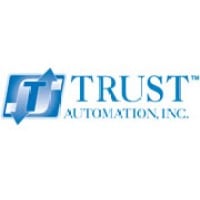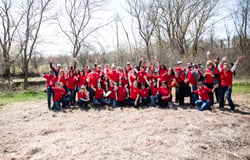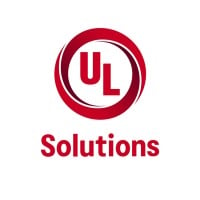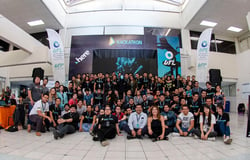Trust Automation
Trust Automation has over 30 years of experience in custom motors, linear drives, digital drives, and systems which meet the unique needs of its customers. Its product line includes motors, linear drives, digital drives, custom assemblies, and products to fit unique applications and ground-up system design and manufacturing solutions. We design, build and support control and power management systems for the most demanding defense, semiconductor, industrial automation, and medical applications.
Trust Automation is an equal opportunity employer and committed to attracting, hiring, developing, and retaining a skilled, productive, and diverse workforce, personnel with competencies and experience related to the regional and State population. Every employee has an “at-will” relationship with Trust Automation. This means that employment with Trust Automation is at the mutual consent of the employer and the employee and is subject to termination by either party at will, with or without cause or advance notice.
Job Summary
The Trust Automation Test Engineering Team develops test systems and software applications that empower Trust Automation to build and ship best-in-class motion control and cyber security hardware. Test Engineers collaborate with Product Development and Manufacturing teams to create manufacturing test plans for new products, and design fixtures and software to automate these tests.
Test Engineering is a multidisciplinary team, with most projects requiring mechanical, electrical, and software design. The Test Software Engineer is responsible for the software component of these projects, creating a test plan, and supporting the team to solve shared design problems.
A common project for Test Engineering Team is the design and integration of bed-of-nails test fixtures. Test content can include ICT, chip programming, functional/integration tests, motion control, and signal processing. Technical breadth of test content is constantly growing as new products and technologies are added to the Trust Automation portfolio.
Duties and Responsibilities (Software Level 1)
To perform this job successfully, an individual must be able to perform each essential duty satisfactorily. The requirements listed below are representative of the knowledge, skill and/or ability required. Reasonable accommodation may be made to enable individuals with disabilities, who are otherwise qualified, to perform the essential functions.
- Design, deploy, and maintain software used by the Trust Manufacturing Team for building and testing motion control, power conversion, and cyber security products
- Develop test code using Python, C, C#, and TypeScript
- Design manufacturing tests for new products
- Review product requirements, electrical schematics, and other product design documentation to generate requirements for the test design
- Requirement derivation, tracking and verification for test solutions
- Create diagrams of target products and other supporting documents to aid in communication and design of the test
- Create and document a test plan. Lead reviews of the test design with engineers, program stakeholders, and external customers
- Implement test software using Python and other programming languages
- Create work instructions that guide Test Operators through execution of the test
- Create and execute a validation plan to confirm that the test implementation meets design goals prior to release for use in manufacturing
- Assist in building prototype test hardware including cable assemblies, hardware integration, specification and ordering of components, and mechanical assembly
- Work under technical supervision and/or pre-established guidelines to develop skills and perform project tasks.
- Build product knowledge, using that knowledge to:
- Contribute to troubleshooting documentation
- Train and assist peers to identify and troubleshoot product issues
- Design and execute experiments to characterize product design issues. Create reports to communicate findings. (i.e. - perform root-cause analysis).
- Troubleshoot test system and product issues using tools such as:
- Multimeters
- Oscilloscopes
- Logic and protocol analyzers
- Network analyzers
- Debuggers (e.g., pdb, gdb) and trace probes (e.g., Segger)
- Provide production support in the factory by supporting product launch, executing tests, deploying hot fixes, and troubleshooting operational systems.
- Perform full regression testing for software release candidates
- Participate in Trust Automation’s design and development processes, including design reviews
- Assist Program Managers and Trust VPs with project/program planning, including specification of system application solutions, task prioritization, and risk mitigation
- Contribute to project/program success by meeting deliverables on schedule and within budget
Duties and Responsibilities (Software Level 2)
- Design, deploy, and maintain software used by the Trust Manufacturing Team for building and testing motion control, power conversion, and cyber security products
- Develop test code using Python, C, C#, and TypeScript
- Design manufacturing tests for new products
- Review product requirements, electrical schematics, and other product design documentation to generate requirements for the test design
- Requirement derivation, tracking and verification for test solutions
- Create diagrams of target products and other supporting documents to aid in communication and design of the test
- Create and document a test plan. Lead reviews of the test design with engineers, program stakeholders, and external customers
- Implement test software using Python and other programming languages
- Create work instructions that guide Test Operators through execution of the test
- Create and execute a validation plan to confirm that the test implementation meets design goals prior to release for use in manufacturing
- Assist in building prototype test hardware including cable assemblies, hardware integration, specification and ordering of components, and mechanical assembly
- Perform a variety of complicated tasks, primarily relying on job experience to accomplish projects goals. A wide degree of creativity and latitude is expected.
- Lead and direct other engineering teammates as needed.
- Become a product knowledge expert, using that knowledge to:
- Contribute to troubleshooting documentation
- Train and assist peers to identify and troubleshoot product issues
- Design and execute experiments to characterize product design issues. Create reports to communicate findings. (i.e. - perform root-cause analysis).
- Troubleshoot test system and product issues using tools such as:
- Multimeters
- Oscilloscopes
- Logic and protocol analyzers
- Network analyzers
- Debuggers (e.g., pdb, gdb) and trace probes (e.g., Segger)
- Provide production support in the factory by supporting product launch, executing tests, deploying hot fixes, and troubleshooting operational systems.
- Perform full regression testing for software release candidates
- Participate in Trust Automation’s design and development processes, including design reviews
- Assist Program Managers and Trust VPs with project/program planning, including specification of system application solutions, task prioritization, and risk mitigation
- Contribute to project/program success by meeting deliverables on schedule and within budget
Position Requirements (Software Level 1)
- Minimum Qualifications:
- BS in Computer Engineering, Computer Science, Electrical Engineering, or equivalent
- Software/firmware design experience, including programming skills with higher level languages (i.e. - C)
- Experience building and maintaining software applications in Python or C#
- Basic electronics knowledge: familiarity with digital and analog circuits
- Experience using test equipment (oscilloscope, DVM, function generator, logic analyzer, etc…)
- Target level debugging skills
- Typically 0 to 4 years of engineering experience
- Ability to read and understand electrical schematics
- Experience with command-line interfaces
- Experience building on or deploying to headless Linux systems (or an unabashed enthusiasm to learn)
- Experience with digital and analog I/O using data acquisition hardware or similar (i.e. - LabJack, Arduino)
- Familiarity with the following serial protocols: SPI, I2C, RS232/RS422/RS485. Ability to convert a logic analyzer or scope trace of one of these to bytes.
- Experience using statistical analysis methods
- Excellent written and oral communication skills
- Ability to create visual aids
- Ability to identify and present meaningful data
- Ability to professionally engage with customers and partners external to the company
- Thrives in an innovative, multidisciplinary design team environment
- Ability to manage time effectively and work effectively with teammates and management
Position Requirements (Hardware Level 2)
- Minimum Qualifications:
- BS in Computer Engineering, Computer Science, Electrical Engineering, or equivalent
- Software/firmware design experience, including programming skills with higher level languages (i.e. - C)
- Experience building and maintaining software applications in Python or C#
- Basic electronics knowledge: familiarity with digital and analog circuits
- Experience using test equipment (oscilloscope, DVM, function generator, logic analyzer, etc…)
- Target level debugging skills
- Self-accountable and able to work with minimal oversight
- Typically 5 to 8 years of engineering experience
- Ability to read and understand electrical schematics
- Experience with command-line interfaces
- Experience building on or deploying to headless Linux systems (or an unabashed enthusiasm to learn)
- Experience with digital and analog I/O using data acquisition hardware or similar (i.e. - LabJack, Arduino)
- Familiarity with the following serial protocols: SPI, I2C, RS232/RS422/RS485. Ability to convert a logic analyzer or scope trace of one of these to bytes.
- Experience using statistical analysis methods
- Excellent written and oral communication skills
- Ability to create visual aids
- Ability to identify and present meaningful data
- Ability to professionally engage with customers and partners external to the company
- Thrives in an innovative, multidisciplinary design team environment
- Ability to manage time effectively and work effectively with teammates and management
Physical Requirements
- Hearing and speaking to exchange information in person, on the telephone or virtually.
- Dexterity of hands, fingers, and wrist to operate a computer keyboard, calculator, or assemble/manufacture intricate items.
- Seeing to read a variety of materials.
- Sitting or standing for extended period of time.
- Physical agility to lift up to 50 pounds to shoulder height. Any items that weigh more than 50 pounds will require two or more people or a lifting device to move.
- Physical agility to lift, carry, push, or pull objects.
Pay/Salary Information
Pay scale for this position - $118,657.43- $125,00.00 annually
By submitting your application, you acknowledge that you have read and understand the information provided within. You certify that the information contained in this application is correct to the best of your knowledge. You understand that to falsify information is grounds for refusing to hire, or for discharge should you be hired.
Top Skills

What We Do
Trust Automation has 25 years of experience in custom; motors, linear drives, digital drives and systems which meet the unique needs of its customers in the Defense, Semiconductor, Industrial Automation, Greentech and Medical industries. Its product line includes; motors, linear drives, digital drives custom assemblies and products to fit unique applications and ground-up system design and manufacturing solutions. As of today, Trust Automation has grown to a 50,000 square foot facility that supports its 70+ team of engineers, designers, manufacturers and customer service employees.









